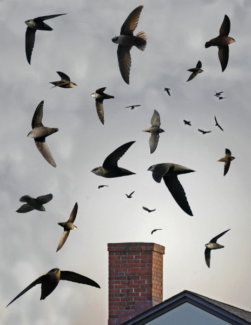Understanding the Patterns of Chimney Swifts
Wintering in South America and migrating to eastern North America, Chimney Swifts spend most their time in flight. They usually arrive in the U.S. in the later part of March for breeding and leave around early November. Often referred to as flying cigars, these birds make this journey in large flocks which is how they typically travel.
Chimney Swifts traditionally used hollow trees to build their nests in but are now commonly being found nesting in urban areas, especially house chimneys and smoke stacks. This is partially due to the loss of older forests to cutting and thinning. This has made finding adequate nesting areas difficult and may be contributing to their declining numbers.
Flying almost constantly, Chimney Swifts eat in flight feasting on mosquitoes and other flying pests. Just like bats, Chimney Swifts are beneficial to humans eating several times their weight. Their feeding schedules are just the opposite though, as bats are headed out to feed in the evening Chimney Swifts are returning to their nests. They even drink while flying, swooping down just above the water and dipping their beak into the water.
Their flight has been called agile and acrobatic yet erratic. A flock, sometimes called a swoop of swifts, can ride thermals to great heights before gliding back down towards earth. Their ability to make aerobatic moves in unison makes them a joy to watch.
These birds are monogamous and both parents share in the incubation of their eggs. With an average of 3-7 eggs, this incubation takes 19-21 days before hatching. The young babies are then fed by both parents for the next 30 days or until the birds are ready to fly on their own.
While not yet endangered their numbers have been dropping which has caused some concern. This has earned them a place on the Threatened Species list. They are also protected by state and federal laws including the Migratory Bird Act of 1916.
Contact the CSIA certified chimney sweep & fireplace professionals at Ashbusters Chimney Service in Nashville, TN today at 615-833-0349. We have all the information that you need to understand why chimney swifts are in your chimney system. Also, call us to schedule an appointment to safely and humanely remove the chimney swift(s) from the interior of your chimney. We have over 35 years experience in the chimney & fireplace industry and are more than willing to help you. Later, please connect further with us online at our social media outlets (Facebook, Twitter, Yelp, & YouTube). We’d also appreciate you leaving us a great review online at Google. We use these reviews to improve our services and serve our customers better. Thanks, and we look forward to hearing from you very soon.
